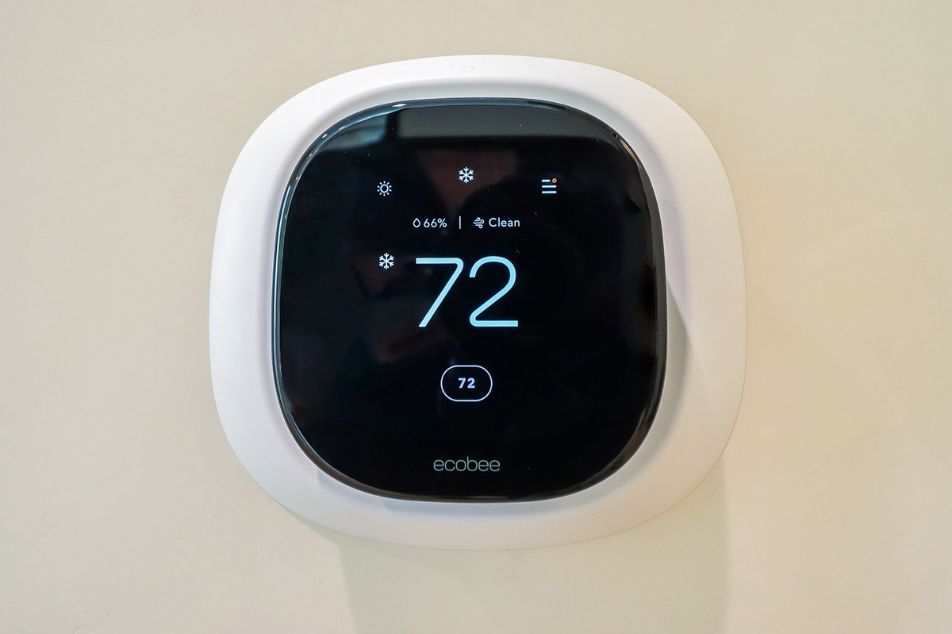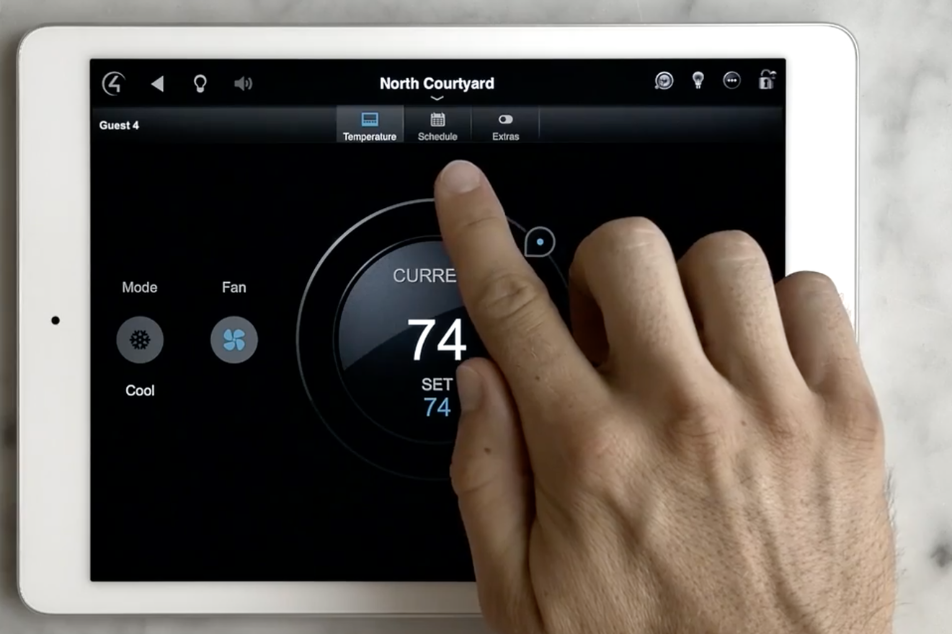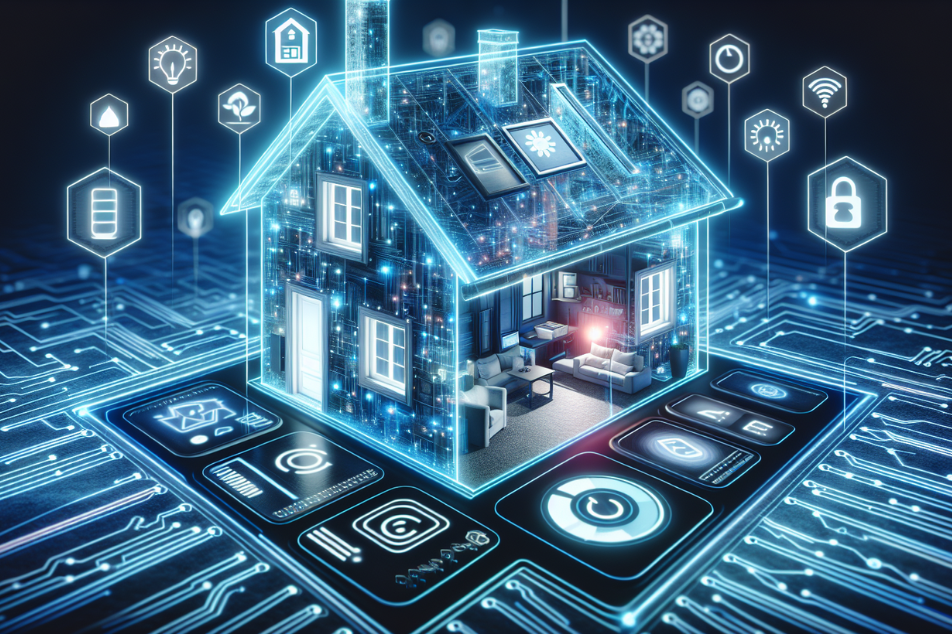Discover the Best Smart Home Solutions for Efficient Climate Control: Enhance Comfort and Save Energy in Your Modern Home
Achieve Ultimate Comfort and Energy Efficiency: Explore the Best Smart Home Solutions for Climate Control
Smart home solutions integrating climate control for modern living enhance comfort, efficiency, and sustainability in your home. By automating temperature, humidity, and air quality adjustments, these systems create the perfect environment while saving energy. In this article, we’ll explore the top smart climate control solutions, their benefits, and how they integrate seamlessly into your home.
Key Takeaways
-
Smart climate control systems integrate temperature, humidity, air quality, and energy consumption management, enhancing comfort and sustainability in modern homes.
-
Advanced smart home technologies, including intelligent thermostats, zoning systems, and remote access, provide tailored and efficient climate control for different home areas.
-
Integration with existing HVAC systems and other smart devices, coupled with energy monitoring and management, allows for substantial energy savings and an optimized living environment.
Top Smart Home Solutions Integrating Climate Control for Modern Living

Smart home technology has come a long way, offering a plethora of benefits that extend far beyond mere convenience. At the heart of this revolution lies the integration of climate control systems, which form a crucial component of the modern smart home ecosystem. These advanced solutions provide homeowners with unparalleled control over various aspects of their living environment, including:
-
Temperature
-
Humidity
-
Air quality
-
Energy consumption
One of the standout features of smart climate control is its ability to seamlessly integrate with other smart home systems. Comprehensive solutions like Control4 ensure harmony between different components, creating a cohesive and user-friendly platform that enhances the overall living experience. This integration allows for automated schedules, occupancy-based adjustments, and energy usage monitoring, presenting significant opportunities for energy savings and improved comfort.
Diving into the realm of smart climate control, we’ll uncover the transformative potential of these technologies, turning our homes into efficient, comfortable, and eco-friendly havens.
Introduction
The world of smart home technologies is rapidly expanding, with custom homes at the forefront of this exciting revolution. No longer confined to the realm of science fiction, these innovations have become mainstream aspects of modern living, offering a perfect blend of comfort, convenience, and efficiency. At the heart of this transformation lies the integration of smart climate control systems, which have elevated the concept of home comfort to new heights.
Smart climate control goes beyond simply adjusting the temperature of your home. It encompasses a wide range of technologies, from intelligent HVAC systems to smart thermostats and sensors, all working in harmony to create the perfect living environment. These systems offer unprecedented control and efficiency, allowing homeowners to tailor their surroundings to their exact preferences while simultaneously optimizing energy usage.
Exploring the multifaceted world of smart climate control, you’ll see how these cutting-edge technologies can morph your living space into an adaptive, energy-saving, and cozy refuge.
Intelligent Climate Control Systems

One of the key advantages of these systems is their ability to learn and adapt to your preferences and routines. Through the integration of sensors with AI and machine learning, intelligent climate control systems can analyze data more precisely and enhance control of building systems. This means your home can automatically adjust temperature, humidity, and air quality based on factors such as time of day, occupancy, and even your personal schedule.
Smart Thermostats
The smart thermostat, a game-changer in how we regulate our home’s temperature, is the cornerstone of any intelligent climate control system. These innovative devices are far more than just digital versions of traditional thermostats; they are sophisticated tools that learn from your habits, adapt to your preferences, and optimize your home’s energy usage. Smart thermostats offer a range of features including automated schedules, geo-fencing, and integration with other smart devices, making them an essential component of modern smart home climate control solutions.
One of the most impressive aspects of smart thermostats is their learning capability. These devices can:
-
Create customized temperature schedules based on your behavior and preferences, making automatic adjustments over time.
-
Get to know your routine and adjust the temperature accordingly, ensuring optimal comfort while minimizing energy waste.
-
Incorporate geofencing technology, which uses GPS to adjust temperature settings based on your location.
-
Ensure that your home is always at the perfect temperature when you arrive, while conserving energy when you’re away.
With these advanced capabilities, smart thermostats are not just controlling your home’s climate; they’re actively working to enhance your comfort and reduce your energy bills.
Integration with HVAC Systems
The real strength of smart climate control is its flawless melding with existing HVAC systems. This integration allows for a level of performance optimization that was previously unattainable with traditional setups.
One of the most valuable features of this integration is the ability to provide maintenance alerts and diagnostics. Smart thermostats can monitor system performance and detect malfunctions, alerting homeowners to potential issues before they become major problems. This predictive maintenance approach not only helps to extend the life of your HVAC system but also ensures that it’s always operating at peak efficiency. Some smart HVAC systems even include safety features that can detect unusual operation patterns and alert you to potential hazards, adding an extra layer of protection to your home.
Some benefits of smart thermostats include:
-
Maintenance alerts and diagnostics
-
Extended HVAC system life
-
Peak efficiency
-
Safety features
By bringing together the power of smart technology with traditional HVAC systems, we’re creating homes that are not just more comfortable, but safer and more efficient as well.
Energy Monitoring and Management

A key benefit of smart climate control systems is their capacity for optimizing energy consumption using sophisticated monitoring and management tools. These systems offer:
-
Sophisticated sensors and algorithms to gather data on indoor conditions and occupancy patterns
-
Precise adjustments to heating and cooling
-
Substantial reductions in energy consumption
-
Lower utility bills
This level of control goes far beyond what’s possible with traditional HVAC systems.
Smart home energy management systems take this a step further by automatically performing certain actions to reduce energy consumption while still meeting specific lifestyle needs. For instance, these systems can adjust temperature settings based on occupancy, time of day, or even weather forecasts. They can also integrate with other smart home devices, such as automated blinds or smart lighting, to create a holistic approach to energy management.
Remote Access and Control

A major allure of smart climate control systems is the convenience of managing your home’s environment from any location, and at any time. Through smartphone apps and internet connectivity, these systems offer unprecedented levels of control and convenience. Users can adjust temperature settings, modify schedules, or even switch their HVAC system on or off, all from the palm of their hand. This remote access eliminates the need to search for traditional remotes or manually adjust thermostats, enhancing the overall user experience.
The benefits of remote access include:
-
Convenience: homeowners can make real-time adjustments based on changing plans or unexpected events
-
Improved comfort: you can ensure your home is pre-cooled or pre-heated before you arrive
-
Energy savings: precise scheduling can avoid heating or cooling an empty house
These benefits make remote access a valuable feature for homeowners.
Many homeowners have reported enhanced comfort and convenience through these smart AC systems, appreciating the ability to:
-
Monitor and adjust temperature settings via smartphone apps or voice commands from anywhere with an internet connection
-
Create personalized schedules for temperature settings
-
Receive energy usage reports and recommendations for energy-saving settings
-
Integrate with other smart home devices for seamless automation and control
As we continue to embrace the era of connected living, the remote access and control capabilities of smart climate systems stand out as a key feature in creating truly responsive and efficient homes.
Personalized Comfort Settings
Smart thermostats, a key component of these systems, can adjust temperature settings based on individual preferences and daily routines. Many of these devices have learning capabilities that adapt to a user’s schedule, providing optimal comfort without requiring constant manual adjustments. Users can schedule specific temperatures for different times of the day, ensuring comfort during:
-
morning routines
-
work hours
-
sleeping time
-
special events
Compatibility with Other Smart Devices
In the woven fabric of smart home technology, it’s vital for climate control systems to blend flawlessly with other devices. Smart thermostats, the central hub of many climate control systems, can connect with popular home automation platforms like Google Home, Amazon Alexa, Josh AI, allowing for unified control and enhanced functionality. This integration extends the capabilities of your climate control system, enabling it to work in harmony with other aspects of your smart home.
The compatibility of smart climate control systems goes beyond just thermostats. Smart security systems, including video doorbells, surveillance cameras, and smart locks, can be integrated to enhance both comfort and safety. For instance, your security system could trigger your climate control to adjust settings when you leave or return home. Similarly, smart lighting systems can be synchronized with your climate control, adjusting brightness and color temperature to complement the ambient temperature and time of day.
When planning a smart home setup, it’s essential to research compatibility to ensure seamless integration with existing devices. Comprehensive solutions like Control4 play a pivotal role in ensuring harmony across various smart home systems, creating a cohesive and user-friendly experience. By integrating climate control with other smart devices, homeowners can create truly responsive living environments that adapt to their needs and preferences automatically.
Voice-Activated Controls
Within the sphere of smart home technology, voice-activated controls have surfaced as a game-changer, providing unmatched ease of use and accessibility. Home automation assistants like Amazon Alexa, Google Home, and Josh AI have made it possible to manage various aspects of your home, including climate control, with simple voice commands. This hands-free operation is particularly beneficial for individuals with mobility or vision impairments, making smart home technology more inclusive and user-friendly.
The integration of voice control with climate systems allows users to:
-
Adjust comfort settings effortlessly
-
Change the temperature
-
Switch modes
-
Set up a new schedule
It can all be done with just a few taps or a simple voice command. The process typically involves capturing commands through smart speakers or mobile devices, which are then processed to execute actions across connected smart home devices.
To optimize the voice control experience, users can customize command phrases and set up routines or scenes, creating a truly personalized interaction with their smart home. As voice recognition technology continues to advance, we can expect even more intuitive and responsive climate control systems in the future.
Smart Sensors
A network of smart sensors forms the core of any intelligent climate control system. These advanced devices play a crucial role in optimizing HVAC system performance, detecting occupancy, and monitoring air quality. Smart HVAC systems utilize motion and humidity sensors, along with AI algorithms, to adapt to environmental changes and occupancy patterns. This allows for real-time data collection and precise adjustments to temperature settings, ensuring energy is not wasted on unoccupied spaces.
One of the key advantages of smart sensors is their ability to monitor and respond to various environmental factors. Advanced air quality monitoring tools can measure indoor pollutants and adjust ventilation or activate air purification equipment accordingly. This not only ensures a comfortable living environment but also contributes to the health and well-being of occupants. Additionally, these sensors can detect room occupancy and respond to temperature changes, allowing for more efficient and targeted climate control.
Sustainable Living
Promoting sustainable living, smart climate control systems lead the charge, offering eco-friendly advantages that surpass simple convenience. These systems are designed to optimize energy usage, reducing waste and lowering the overall environmental impact of our homes. One of the key features contributing to sustainability is the ability of smart blinds and shades to automatically adjust to sunlight patterns, enhancing energy efficiency while maintaining comfort. This synergy between different smart home components exemplifies how integrated systems can work together to create more sustainable living spaces.
Another significant aspect of smart climate control systems is their ability to detect occupancy and adjust settings accordingly. Through features like geofencing, smart thermostats can detect when nobody is home and ease off heating or cooling to save energy. This intelligent approach to energy management not only reduces utility bills but also minimizes unnecessary energy consumption.
Many smart home products, including thermostats and lighting systems, are ENERGY STAR certified, recognized for their superior energy efficiency. By incorporating these certified products into their homes, homeowners can be confident that they are making environmentally conscious choices without sacrificing comfort or functionality.
Planning Your Smart Climate Control System
Starting your journey towards a smart home demands thoughtful planning and foresight, particularly when integrating a smart climate control system. The first step in this process is to define your goals. Are you looking to simplify daily tasks, save energy, or boost home security? Understanding your objectives will guide your decisions throughout the planning process.
As you plan your smart climate control system, consider starting with basic items like smart thermostats and smart lighting, gradually adding more devices over time. This phased approach allows you to become familiar with the technology and assess its impact on your daily life before making larger investments.
Expert Consultation
In the realm of implementing a smart climate control system, collaborating with seasoned professionals can be a game-changer. The complexity of smart home technology often requires specialized knowledge and expertise to ensure proper installation, setup, and integration. Get Wired Tec can help design and implement a customized smart home system that perfectly aligns with your needs and preferences.
It is essential to engage in early planning and consultation when integrating smart home technologies. This will help ensure the seamless incorporation of desired features. Expert consultants offer project management services, ensuring smooth coordination between:
-
architects
-
engineers
-
contractors
-
equipment suppliers
By working closely with custom home builders during the design and planning stages, you can achieve optimal integration of smart home technologies while maintaining consistent quality in construction and craftsmanship.
Summary
As we’ve explored throughout this comprehensive guide, smart climate control systems are revolutionizing the way we interact with our living spaces. From intelligent thermostats and zoning systems to voice-activated controls and energy monitoring tools, these technologies offer unprecedented levels of comfort, convenience, and efficiency. The integration of smart climate control with other home automation systems creates a cohesive, responsive environment that adapts to our needs and preferences while optimizing energy usage.
The future of smart climate control is bright, with emerging technologies promising even greater levels of personalization, efficiency, and sustainability. As homeowners, embracing these innovations not only enhances our quality of life but also contributes to a more sustainable future. Whether you’re building a new home or upgrading your existing space, integrating smart climate control is a step towards creating a living environment that is not just comfortable, but truly intelligent. As we continue to push the boundaries of what’s possible in smart home automation, one thing is clear: the smart home revolution is here to stay, and it’s making our lives more comfortable, efficient, and connected than ever before.
Frequently Asked Questions
What are the main benefits of installing a smart climate control system?
Installing a smart climate control system can bring you improved energy efficiency, personalized comfort, remote access via smartphone apps, integration with other smart home devices, and potential cost savings on utility bills.
How do smart thermostats differ from traditional thermostats?
Smart thermostats differ from traditional thermostats as they offer learning capabilities, remote control via smartphone apps, integration with other smart home devices, energy usage reports, and sensors for more accurate temperature readings and occupancy detection. Embrace the convenience and efficiency they provide!
Can I install a smart climate control system in an older home?
Yes, in most cases, you can install a smart climate control system in an older home. It's best to consult with a professional for compatibility and to address any potential challenges specific to older home constructions.
How much energy can I expect to save with a smart climate control system?
You can expect to save around 10-15% on your heating and cooling costs with a smart climate control system, although the exact amount can vary based on factors like home size and insulation. This can lead to significant energy and cost savings in the long run.
Are smart climate control systems difficult to use for someone who isn't tech-savvy?
Smart climate control systems are designed to be user-friendly, with intuitive interfaces and easy-to-use smartphone apps. Professional installation and setup can also ensure that the system is configured for ease of use.
Categories
- Audio-Video
- Home Theater Installation
- Smart Security Systems
- Wi-Fi & Networking Systems
- Control4 Systems
- Savant Control Systems
- Nice Home Management - Elan Control Systems
- Motorized Window Treatments
- Dimmer Switches
- Outdoor Entertainment
- Professional Installation
- Smart Home Automation
- Smart Lighting Systems
- Surround Sound Systems





